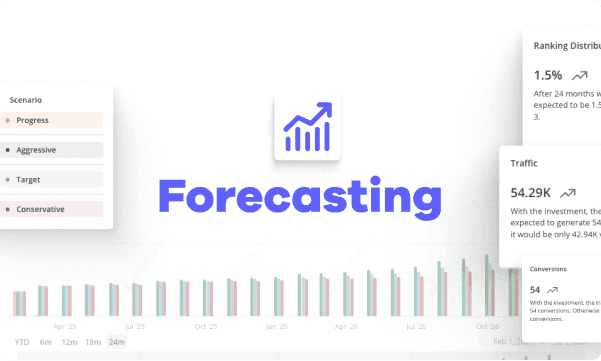7 Tactics to Conduct Effective Keyword Research
Last updated on Sunday, October 15, 2023

Do you want to overcome challenges like low website traffic and poor rankings? Then you need to invest your time and resources into effective keyword research. It makes sure your website matches what people are searching for and helps to understand what your competitors are doing and find ways to stand out.
By doing proper keyword research, you'll get ideas for what to write about and create content that people want to read. Plus, you'll find specific words that might not be searched a lot but can bring in customers who are really interested. Also, keep in mind top-ranking page also ranks in the top 10 search results for nearly 1,000 other relevant keywords.
Keep reading the article to find out how to do effective keyword research and supercharge your online visibility.
How keyword research impacts search engine rankings
Let’s go step by step, and before diving into keyword research steps, let’s discuss how it impacts search engine rankings and traffic:
✓ Targeting the right keywords
Research helps identify relevant keywords to optimize content and improve search engine understanding.
✓ Competing effectively
Selecting less competitive keywords increases the chances of higher rankings in SERPs.
✓ Aligning with user Intent
Understanding user intent through research enhances content relevance and boosts rankings.
✓ Improved visibility
Optimizing with keywords enhances search visibility, leading to more organic traffic.
✓ Targeted traffic
Relevant keywords attract users genuinely interested in your content or products.
✓ Long-term benefits
Ranking well for valuable keywords brings continuous traffic over time.
✓ Continuous refinement
Ongoing research and optimization maintain and improve rankings and traffic.
How to conduct effective keyword research in seven ways
Without hesitation, keyword research should be an integral part of your strategy to enhance and perfect your online presence.

Consider User Intent
Considering user intent during keyword research is crucial for an effective SEO strategy. By understanding what users are looking for, you can create relevant and valuable content that aligns with their needs. This, in turn, leads to higher search engine rankings, increased organic traffic, and improved user engagement, resulting in a more successful online presence.
To consider user intent effectively, analyze search queries and use keyword research tools to identify the different intent types behind them. Craft content tailored to each intent, whether it's informational, transactional, or navigational, to cater to the diverse needs of your audience.
Continuously monitor user behavior and adjust your keyword strategy accordingly, ensuring that your website provides the answers and solutions users are seeking, ultimately enhancing their overall experience and driving better results for your business.
Conducting In-Depth Topic Research
Conducting in-depth topic research is a crucial component of effective keyword research, helping you uncover valuable insights and discover relevant keywords that resonate with your audience. By leveraging content research tools, exploring user-generated content, and identifying emerging trends, you can gain a comprehensive understanding of your target audience's interests and preferences.
This approach enables you to create content that not only ranks well in search engines but also engages your users, resulting in higher traffic and better user satisfaction.
Through in-depth topic research, you can strike a balance between trending subjects and evergreen topics that remain relevant over time. Staying updated on the latest industry developments and understanding user questions and concerns allow you to capitalize on new keyword opportunities before they become highly competitive. As a result, you can refine your SEO content strategy to align with user intent, establish your website as an authoritative source, and foster long-term success in your digital marketing efforts.

Source: Searchengineland
Filter and Prioritize Keywords
Finding, filtering, and prioritizing keywords is a critical process in keyword research to identify the most valuable and relevant keywords for your SEO strategy. Here's how to approach each step:
Find keywords - Utilize keyword research tools to discover a wide range of keywords related to your niche or topic.
Analyze competitor keywords - Look at your competitor's websites to see which keywords they are targeting. Analyzing competitor keywords can provide valuable insights and help you identify keyword opportunities.
Brainstorm and expand - Conduct brainstorming sessions to generate additional keyword ideas that might not appear in the research tools. Think about different variations, synonyms, and related terms.
Filter keywords - Filter out keywords that are not directly related to your content or business. Focus on keywords that align with your target audience and offerings.
Search volume - Consider the search volume of keywords. High search volume keywords may be more competitive, while low search volume keywords might not bring substantial traffic. Aim for a mix of both.
Keyword difficulty - Evaluate the difficulty of ranking for specific keywords. Avoid extremely competitive keywords that might be challenging to rank for and focus on those with a balanced level of competition.
Prioritize keywords - Prioritize keywords that align with the intent of your target audience. Understanding user intent ensures that your content meets the expectations of searchers.
Conversion potential - Give priority to keywords that have a higher potential to convert visitors into customers. Transactional keywords or long-tail keywords with clear purchase intent are often good choices.
By filtering and prioritizing keywords effectively, you can build a robust keyword strategy that enhances your website's visibility, attracts the right audience, and drives meaningful results for your online presence. Regularly review and update your keyword list to adapt to changing market trends and user behavior.
Monitoring and Refining Keyword Strategy
Organizing and grouping keywords is essential for a successful SEO strategy. By categorizing keywords based on topics, user intent, and search volume, you can create targeted content marketing campaigns that resonate with your audience and ranks well in search engines.
This organized approach also helps improve your website's structure, making it easier for both users and search engines to navigate and find relevant information.
Moreover, considering the user journey and maintaining a scalable structure for keyword organization ensure that your website remains user-friendly and adaptable to future growth. With a well-organized keyword strategy, you can enhance your website's visibility, attract the right audience, and achieve meaningful results in your digital marketing efforts.

Regularly Track Keyword Performance
Monitor the performance of your target keywords using tools and a search console. Keep an eye on fluctuations in rankings, click-through rates, and organic traffic for key pages.
Identify keywords that are driving significant traffic and conversions, as well as those that may need improvement. Additionally, stay away from potential cases of keyword cannibalization to ensure optimal keyword targeting across your content.
Stay informed about industry trends, news, and changes that might impact search behavior. New technologies, emerging topics, or shifts in consumer preferences can create new keyword opportunities.
Regularly analyze your competitors' keyword strategies to identify any new keywords they might be targeting or to spot gaps that you can capitalize on.
Look for changes in their content focus or SEO tactics that may offer insights into shifting keyword trends.
Make keyword research an ongoing process using keyword research tools. Discover new keywords, assess their potential, and refine your keyword list regularly. Some tools provide insights into seasonal trends, search volume changes, and related keyword suggestions, which can be valuable for adapting your strategy.
With the rise of voice search and mobile device usage, consider adapting your keyword strategy to cater to these trends. Focus on long-tail and conversational keywords that align with voice search queries and ensure your website is mobile-friendly.
Experiment with new keywords and content approaches to see how they perform. A/B test different variations of content and keyword usage to identify what resonates best with your audience.
Use the insights gained from these experiments to adapt your keyword research process and content strategy accordingly.
By continuously monitoring and adapting your keyword research process, you can maintain a competitive edge. Moreover, you can keep your content relevant, and ensure your website remains visible to your target audience.
To sum up
Keyword research is an extremely important step for crafting targeted content that resonates with your target audience and ultimately gaining a competitive edge. By dedicating your efforts to keyword research, you can get insights on how to tailor your content to your audience's needs for maximum engagement.
In our article, we talk about the importance of this approach and suggest actionable tips for proper keyword research that can enhance your online visibility. Don't hesitate to implement them and watch your online presence flourish.

Article by:
Lilit
SEO content writer at SayNine.ai
Lilit is an SEO content writer at SayNine.ai and a literature admirer. She believes that words have power and that we should use them for good. If not writing, Lilit loves to play with her nephews, then water the flowers and trees of their garden.


